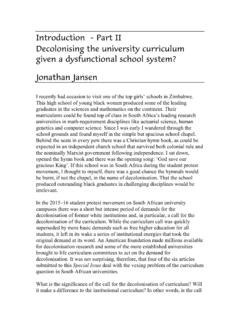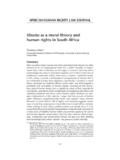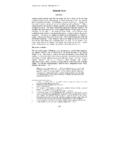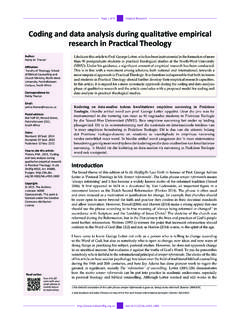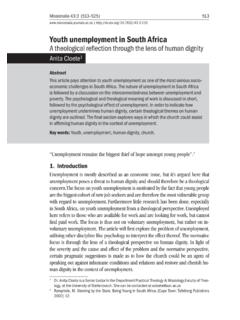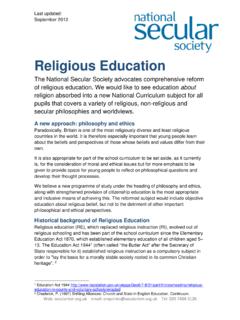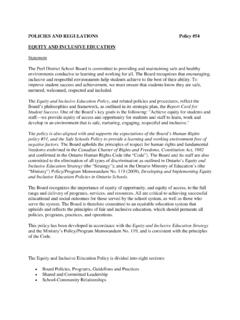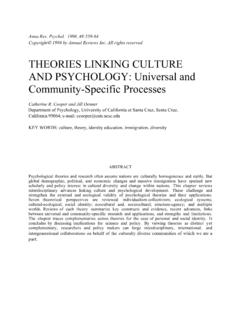Transcription of Teachers’ experience of the implementation of …
1 South African Journal of education ; 2014; 34(1)1 Art. # 727, 13 pages, experience of the implementation of values ineducation in schools: Mind the gap C Ferreira and S SchulzeDepartment of Psychology of education , University of South Africa, South many societies violence, crime and intolerance have become an everyday reality. In thiscontext teachers are responsible for facilitating values in education . The study aimed toinvestigate teachers experiences of the implementation of values in education in classroompraxis. Constructivism was used as conceptual framework. Data were collected by means ofinterviews with 14 participants. The findings revealed that there was a gap between policymakers intentions and teachers perspectives. This gap related to the teachers poor under-standing of the concept values in education , exacerbated by a lack of reflexivity about theissue; a failure to address the influence of teacher identity on values in education ; a need forsuitable training; a lack of knowledge on how to address practical challenges with values ineducation or how to consider the hidden curriculum, and how to use different strategieseffectively to facilitate values in education .
2 Our main conclusion is that education initiativesso far have had little impact on the implementation of values in education in selected for improvement are : constructivism; teachers experience ; values in educationIntroduction What transforms education , is a transformed being in the world Palmer (1999:1).This profound statement by Palmer (1999) hints at the importance of values and valuesin importance of dealing with values effectively in schools is illustrated by thefact that the current generation of youth, particularly from emerging economy coun-tries, countries in developing democracies and countries with scarce resources andhigh need, has only known a society characterised by rampant change, cultural andreligious diversity, dislocated families, unemployment and increasing anxiety aboutrisk. Many schools in South Africa are depicted as sites where disrespect for the law,racial intolerance and violence proliferate. The Department of education (DoE) hasrecently publicly acknowledged that violence is, indeed, a problem in South Africanschools based on data gleaned from a study undertaken by the Centre for Justice andCrime Prevention (Burton, 2008).
3 It is against this background that teachers have toimplement values in to Solomons (2009), it is assumed that teachers have the expertise tonavigate impartially between conflicting value-orientations that may co-exist in multi-cultural classrooms such as in South Africa. This is in spite of the fact that different2 Ferreira, Schulzeteachers may have opposing views of what constitutes values in education , whichvalues should be given priority and for what reasons, and what learning theory isinvolved. Rhodes and Roux (2004) have therefore indicated that there is a lack ofcomprehensible directives on how to deal with values in education in the consideration of the above, the main research question of this investigation was:How do teachers experience the implementation of values in education in the curri-culum? Accordingly, the aim of this research was to reveal the problems teachersencounter when implementing values in education in terms of National CurriculumStatement (NCS) policy (DoE, 2000).
4 This may help to stimulate further reflection anddebate on values in education . It may also facilitate further research on the issue, theimportance of which has been indicated (Hofstee, 2006).Woven into the fabric of curriculum discourses for values in education is con-structivism. According to the DoE (2000), it is important that teachers understand andimplement constructivist principles of teaching and learning. Therefore we selectedconstructivism as conceptual framework for this article even though there are alsoother philosophies underpinning values in term, constructivism , is found ubiquitously in the field of education inmany forms and interpretations and its advocates have a considerable number of as-sumptions about knowledge (Joldersma, 2011:275). However, the different pedagogiesbased on constructivist theory all seem to have six characteristics in common (Fox inHenze, 2009; Sremac, 2010; Vygotsky, 1978; Watts & Bentley, 1991), which are alsoapplicable to the learning of values: Learning, including the learning of values, is an active process.
5 Knowledge and insight ( knowledge of values) is constructed and not inbornor passively absorbed. Knowledge is formulated, rather than discovered. Although knowledge is individual and particular, it is also socially constructed. Learning is essentially a process of trying to understand the world. Effective learning requires meaningful, open ended, challenging problems the above background, a literature review is presented in the next review: Values in educationDiscourse on values in education in the curriculum is firmly grounded on the Con-stitution of South Africa and the Bill of Rights that provide the rationale for curriculumtransformation that mirror the ideals of a democracy. Initiatives of the DoE that have influenced various debates on values in education include the Report of the WorkingGroup on Values in education (DoE, 2000). This initiative was the starting pointtowards identifying the values that would ultimately be included in the curriculum.
6 Thereport of this working group culminated in a second initiative known as the SaamtrekConference on Values, education and Democracy in the 21st Century. This conferenceSouth African Journal of education ; 2014; 34(1)3resulted in The Manifesto on Values, education and Democracy (DoE, 2001), that wasendorsed by the NCS and served as an example of a set of human rights values (HRVs)which had been constructed socially as a means of supporting texts in a specificeducational it was not clear why certain values were adopted and not others, theManifesto prescribed 10 HRVs for inclusion in the curriculum which would addresssocial ills such as intolerance, violence and crime. These values were democracy,social justice and equity, equality, non-racism and non-sexism, ubuntu (humandignity), an open society, accountability, the rule of law, respect and Manifesto also provided teachers with 16 strategies to facilitate HRVs. Thesestrategies were dealt with in the Life Orientation (LO) component.
7 However, HRVsneeded to be integrated across the curriculum (DoE, 2002)Several documents and research reports further emanated from initiatives from theDoE that support the inclusion of HRVs in the curriculum. For example, the HumanRights education in Diverse Religious and Cultural Contexts (HREiD) (2013), whichwas established in 2004, consists of a research group that promotes human rights ineducation as praxis. However, as Keet and Carrim (2006) asserted, the mandate toinfuse the curriculum with HRVs was far from clear. They indicated that the inte-gration of HRVs into curricula should be directed by structured processes, should beconfigured and reconfigured to suit different needs in contexts and should allow fora multitude of ways of confirms that values do not exist in a void and are therefore open to manyinterpretations (Du Preez, 2008; Morrison, 2000). HRVs can be viewed as culturalvalues if they are applied in a particular context (Du Preez & Roux, 2010; Morrison,2000).
8 HRVs may also be described as universal, communal values grounded in theprinciples underpinned by the declaration of human rights in the South African Bill ofRights (1996) (Du Preez, 2007). Thus HRVs in curricula can include various identitiesand respect religious and social distinctions (Morrison, 2000). In consideration of theaforementioned, we will refer mainly to the umbrella-term, values in education , alsotaking cognisance of the various perspectives and terminologies that form part of thevalues in education narrative in South implementing values in education , teachers need to understand construc-tivist notions of teaching and learning, as mentioned. As Terwel (1999:198) asserted, constructivism is not a robust concept: it seems to flourish under relatively idealeducational circumstances . This issue could impact on the implementation of valuesin education . Thus, the aim of the research was to investigate how teachers experiencethe implementation of values in education in terms of curriculum policy.
9 To this end,the following sections explain the research design, findings, and designThe research was qualitative in nature as the study aimed at gaining an in-depth under-4 Ferreira, Schulzestanding of how teachers experienced values in education in school. We thereforeidentified phenomenology as an appropriate research design for the study (Higgs &Smith, 2006).Sampling decisions were carefully made. Purposive and maximum variationsampling (McMillan & Schumacher, 2010) ensured that key role players from a varietyof schools and contexts were involved. The reason for deciding on maximum variationsampling was because we expected that teachers from diverse geographical areaswould have different perspectives on values in education . The participants thereforeranged from private and ex-model C schools in urban areas to poor, rural schools.(Ex-model C schools serve privileged students from the immediate school environ-ment. Since affordability was a key issue, the schools were mainly attended by middleclass to affluent, white students.)
10 One private school and two ex-model C schools werelocated in urban areas, a township school was also in an urban area, and three schoolswere in rural areas. Thus, seven schools were involved. In all instances the schoolswere chosen for their geographical location and for their willingness to noted, at each site, we selected the key role players for the study. This impliedasking each school to identify their most knowledgeable or experienced person invalues in education , who would be available for an interview and willing to the schools, this was generally the LO teacher or a manager that was also directlyinvolved in the teaching of LO. In some instances the manager was the head of therelevant department. In another instance, the principal of the township school acted asLO teacher because of her special interest in the field that related to her originaltraining. LO is also often allocated to any teacher or manager to teach when there arenot enough specialists to do so.

